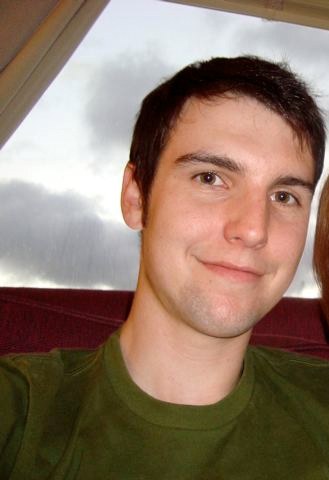A Conversation With Andrew Ramadge, news.com.au and music journalist
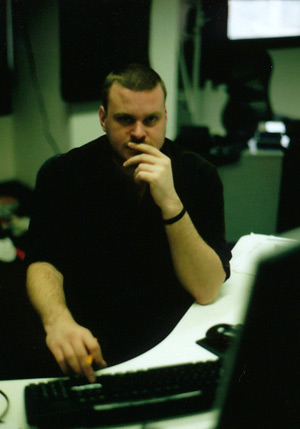 Here’s a conversation I had in August with Andrew Ramadge [pictured right], one of my favourite Australian journalists. He writes about consumer technology for news.com.au, and music for Mess+Noise and The Brag. He came to my rescue when I was humbled by Hungry Kids Of Hungary. He’s written a lot, but my favourite article of his – the one that really brought him to my attention – is ‘Tall Tales And True‘, a look at the state of Australian music journalism for M+N in March 2009.
Here’s a conversation I had in August with Andrew Ramadge [pictured right], one of my favourite Australian journalists. He writes about consumer technology for news.com.au, and music for Mess+Noise and The Brag. He came to my rescue when I was humbled by Hungry Kids Of Hungary. He’s written a lot, but my favourite article of his – the one that really brought him to my attention – is ‘Tall Tales And True‘, a look at the state of Australian music journalism for M+N in March 2009.
Andrew: Hey Andrew. I’m mostly interested in how you got into journalism, and how you’ve progressed from print to online journalism. When did you first become interested in writing professionally?
My father was a journalist and he still is. He edits a newspaper now. When I was a bit younger, I swore that I wouldn’t get into the media, that I wouldn’t follow in his footsteps, which as you can tell; I failed at. [laughs]
The first time I realised I really loved writing was when I was at university, in Melbourne. I was doing a Bachelor of Arts. Most people do a Bachelor of Arts when they don’t know what else to do, or when they just want to get on the dole for a while. I was one of those people who really enjoyed it. I loved writing essays, forming arguments, and at the same time I was reading the street press, and reading record reviews. I’ve always loved music. At that point, the street press critics were emerging writers and I thought I could do that as well. I sent in reviews to Beat and that’s how I got started.
So music journalism was your way into the industry?
Yeah, that and the fact that my father was a journalist, so I suppose people would say I always had it in me, anyway. After I finished my degree, I moved to Sydney. I was looking for work and a position was open at News.com.au and I took it. One of the reasons I got into online journalism was because I started my career as a web developer. I sort of had a little bit of experience in journalism, and a lot of experience in online. It seemed to be the perfect synthesis.
Was the opportunity at News.com.au for a consumer tech journalist, or did that role evolve?
I started off as a general news desk journalist. I was doing a little bit of sub-editing, a little bit of production work, as well as putting in calls, and just highlighting the news of the day. After I’d been there about a year or year and a half, I think, before News.com.au put in a new section for technology. Again, because I’ve got a background in computers, and online development, I was kind of a perfect fit. I applied for that job once it became available and I got it.
Do you find it odd that you find you got a job at News without an internship or without that kind of way into the industry, which I know a lot of students do pursue?
I suppose; I’d already been working when I was in Melbourne, for the street press, and also editing the website for Beat magazine online, so I had an online editor experience. Also, I think internships are becoming more rare nowadays. I think Fairfax may have actually suspended their cadetship program recently.
I think the ways that people get into journalism now are different than they have been in the past. One up-and-coming technology journalists that I know is Ben Grubb, who’s also from Brisbane. He will have a career in the industry because a lot of people know him and are keeping an eye on him. He didn’t do a cadetship. He did it himself. He started a blog. He showed he had talent, ambition, and I suppose he went around making good contacts.
Cool. What did you learn during your time writing for street press? You started as a freelancer, I suppose, and then you became a staff member when you were editing.
Yeah, I started out writing reviews and features. At that point, Beat had a website, but it was pretty perfunctory. It wasn’t very good. I wrote a business case for the publishers of Beat magazine to start a new website for them, and then I built it and edited it. That’s that side of it.
What I learned about writing when I was at street press was the same thing everyone learns, really, which is a pretty good introduction: some free CDs, you get to go to a lot of concerts and meet people and figure out how everything works, really. I also eventually learnt not to be precious, which is another good thing. I learnt that there are only so many times that you can get angry at an editor for changing a few of your words. After that happens for a few years, you sort of get used to it, which is a very good lesson to learn, especially for mainstream media where the editing process is a lot more intrusive.
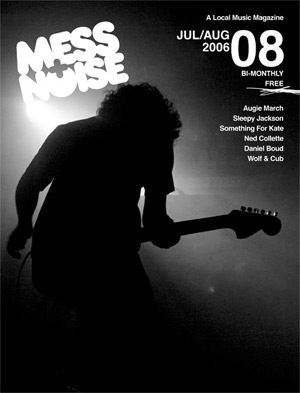
How did you make the transition to Mess+Noise?
When I found out about Mess+Noise, I left Beat. I continued to edit their website but I stopped writing for them, by and large, and threw myself into Mess+Noise, which was the best experience I’ve ever had. It was wonderful.
I joined them for issue two of the print magazine, after I’d seen issue one. That changed the way that I think about everything, really. I went from doing the regular street press thing, which is 400 word reviews and 1,000 word features, to just having free rein to do whatever I wanted. What I wanted to do for Issue 2 was write a 3,000 word piece, not about a particular band, but about a genre and scene in Melbourne, which at the time was the art rock scene, which was centered around the Rob Roy Hotel. That’s what I did.
It was really liberating to just be able to do that. I also realised that anyone could do that. It’s if you have someone who promises they’ll publish it as well, you’ve got an extra impetus.
When I joined Mess+Noise, the editor at the time was Danny Bos, and he really opened up a huge amount of possibilities for me. A bit later on, Craig Mathieson became the editor, and I learned a lot from him, as well.
How did Mess+Noise come about? I’m not too familiar with its history as a print magazine, only the website.
It grew out of another website, which I’m not 100% clear on the back story of, but it was called Mono. It was an Australian music website that was in the late ‘90s, I think. Danny Bos was a member of the team who did that.
After Mono, Danny started Mess+Noise as a website. In some ways it was similar to how it is now. It was mainly a discussion board. He really wanted to put out a music magazine, so as soon as he got organised enough and got his money together, he started doing that. Then it was put out every 2 months for a bit over 2 years. There were 16 issues.
I read that they were purchased by Destra a couple of years ago.
Yeah.
And as of late last year, they’re owned by The Sound Alliance.
Yeah, that’s correct.
How do you think this site got such a strong following and such a devoted, loyal audience? That’s always fascinated me. Its audience seems to be quite opinionated and quite passionate about the indie scene in Australia. How does that come about?
Some of it was a follow on of momentum from Mono, so a lot of the people who used to talk about music on that website followed Danny to Mess+Noise. I also think it grew a reputation over the years of publishing really high quality music journalism, which if you do it for long enough, then it can get you a lot of respect and a lot of people following what you publish.
Do you enjoy writing for the web more than print?
A little while ago I had my first feature in The Weekend Australian; a full-page feature. I enjoyed writing it and seeing it in print, as well. But I suppose I’m one of those writers who is at the right age to still feel very nostalgic about print, which a lot of writers my age do. I had to come to the thinking that “just because it’s in print means that it’s necessarily better than the web”.
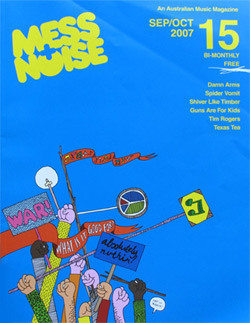
When I opened up the paper that weekend, I still liked reading it and seeing it there, but I realised it wasn’t as important to me as some of the stuff I’ve written for online. I think for me, that sort of distinction between print and the web is starting to go. It’s much more about the quality of the piece itself. It doesn’t matter where it’s published.
You mentioned that a lot of people still think that what appears in print is perhaps more valuable and more valid than its web equivalent.
Yeah.
I think that might be related to the fact that print still pays quite well and it still has that professional reputation, whereas I suppose a lot of other online outlets aren’t..
..don’t have the same reputation and they don’t pay as well, is what I think you’re trying to say? It depends on the magazine, the newspaper, or the news website or whatever. Obviously, street press doesn’t pay very well at all. That’s a print title, whereas the website of Pitchfork Media might pay ten times as much as street press.
Part of it is that. It’s not necessarily whether it’s print or web. It’s just the title that you’re writing for. I can tell you that at News.com.au, we pay our online freelancers a professional rate, the same rate that they would get if they were getting if they were writing for the Sydney Morning Herald in print.
As for reputation, you’re right; with newspapers, let’s continue talking about the Sydney Morning Herald. That’s been around for what, a hundred or more years? I think it has been around for more than a hundred years. Over that time, it has built quite a reputation. If you work a few years in there, then – in a sense – the reputation brushes off on you.
But I guess what we’re going to see now is that websites that have been around for a long time aren’t going to go away. The big websites that are there now, theoretically, are going to continue into the future. If they don’t, another website will take their place. They’ll build their own reputations, as well. Give it another 10 or 20 years and you might end up seeing that websites have a stronger reputation for breaking news or publishing quality journalism than print does.
I guess time will tell on that. You mentioned online freelancers for News Limited titles earlier. Do they employ many of those at the moment?
I’m not really sure how many freelancers we’ve got all up. I know that in the technology section, we’ve had several freelancers.
I spoke to a guy from the Brisbane Times a couple of months back and he said they’d pulled all their freelancers because they couldn’t afford them.
We haven’t dropped any of our freelancers, yet. I’m not sure that we will, either. I think everyone realises that at the moment, online publishers are trying to figure out how to make money, and they’re not being particularly successful. That’s a whole range of reasons, and obviously, that’s why both News Limited and News Corp internationally and Fairfax in Australia have both flagged that they’re probably going to be charging for content soon.
I guess that’s why magazines and newspapers can afford to pay writers 70 cents or $1 per word, in some cases, because they do have a traditional advertiser base who understands the rates, and the magazine editors can apportion rates per what they receive from advertising.
Obviously I’m generalising here and trying to make sense of it, but I can see that website editors might not have figured that out yet, which is where the debate about paid content comes in. They’re trying to monetise the user base.
I’d be happy to talk to you about this off the record, but not on record, only because I don’t want my opinions on the matter to come back to haunt me at work.
Fair enough. You mentioned you got your first piece published in the Weekend Australian. How did you get that in there?

Well, The Australian is owned by News Ltd, which is the parent company – the sister company of News Digital Media, which is the publisher of News.com.au. They had an article that they thought I’d be good at. They sent me an email.
They approached you; that’s interesting. I’m sure, over the years, you’ve become familiar with and adept at pitching article ideas. When did you first start to do that, because I’m assuming that during your time at street press, you didn’t get much freedom to pitch new ideas.
You’re right; I didn’t have a huge amount of freedom in what I could pitch. For example, I couldn’t pitch an article on a band that no one else but myself really cared about and that was never going to pay for advertising. Also, I couldn’t pitch for large opinion pieces or in-depth features that would have taken several pages. That’s not the way that street press works.
I did have a little bit of freedom in being able to pitch about local bands. For example, if there was a really great band in Melbourne, I could pitch to the editor and if they ever had a spare half page or something, then I might be able to use that for a small article, which is one of the limitations of street press – and why I joined Mess+Noise was almost evolutionary for the way that I started working.
I still had to pitch articles. What we used to have in the early editions of the magazine was an editorial board; when I say board, we just met at the pub, really. It was a group of writers and editors, and we’d all have to pitch what we wanted to do to the whole group.
There were no limitations. We could pitch whatever we wanted. Half the time, everyone would be like, “Great, let’s do that.” That’s how I came to write 3,000 word articles about a particular scene. In one case, I think there was a 5,000 word article about one musician, or the ‘storytellers’ series, where I interviewed different musicians about how they came to write some of my favorite songs. That sort of stuff would never have been in street press, but it still was subject to a pitching process.
You started with verbal pitching at the pub. Do you still pitch articles to your current editor?
Of course. Now that I’m working for a big company like News Limited, pretty much every article that I write has to go through a pitching process.
How does a story idea come about? Do you read something you’re interested in and you think about the angle you’d like to take? Or in some cases, would there would be a news event you have to write on, or your editor asks you to write about?
It’s probably a mix of both, about half the time an editor asks me. There are different sorts of editors; there’s a technology editor, and then there is also whoever is actually running the news portion, whether it is the morning editor or the afternoon editor. Something might be going on that they want a story about, so they’ll ask you to write.
The other half of the time you’ll pitch an idea of your own. You’re exactly right; those ideas come from things that you’ve read or perhaps you’ve had a tip from a source, or whatever. Also, the other thing to note is that your story won’t always come through. You might get a tip off and investigate it but find out later that it’s either not worth the story, or someone told you the wrong thing, or it doesn’t stand up.
What makes a good editor?
I’ve worked with different publications and different styles of publications. Obviously, a magazine editor is very, very different than a breaking news editor. By breaking news I mean somewhere at a pace like News.com.au, which tries to stay up with what’s current 24 hours of the day, 7 days of the week, and tries to be informative about what’s going on at that very moment.
I’ll talk about magazine editors in general, only because that’s where I’ve written a lot more of my feature articles for. In a good editor you need confidence; to not accept any bullshit, either. If someone doesn’t like something, they need to tell you and that’s fine. You also need to be very supportive of your writers.
Do you see yourself becoming an editor in the future?
Yeah, and I think I’d really like that as well, but no time soon. I’m not done with my writing yet. There are still a lot of things that I want to write.
You have News.com.au and you’ve got Mess+Noise occasionally. Do you have any other publications that you write for?
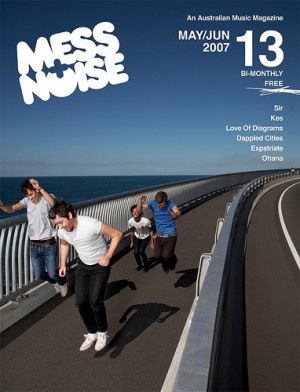 Yeah, I’ve been involved with Mess+Noise for a very long time now, and I used to be an editor there. I was editing the reviews and opinion section of the magazine before it went online. I still write for them whenever I can. It’s just a matter of finding the time now, because I’ve got a full time job and it’s very demanding.
Yeah, I’ve been involved with Mess+Noise for a very long time now, and I used to be an editor there. I was editing the reviews and opinion section of the magazine before it went online. I still write for them whenever I can. It’s just a matter of finding the time now, because I’ve got a full time job and it’s very demanding.
I also have a weekly column in The Brag called Pop In Print. Last year I published an essay for Overland, which is a literary journal. In the future, I’d like to continue publishing pieces in places like Overland and Mess+Noise, which favor in-depth, long-form journalism.
I saw you comment on ‘Tall Tales And True‘ where someone asked you what you got paid for the article. You told them that you’ve long since given up on expecting to be paid for everything you write, and instead you try to focus on what you’re passionate about and telling the best story you can. If you get paid, that’s a bonus. Does that come back to not being precious, which you mentioned earlier?
No, it’s not about being precious, this one. When I first joined Mess+Noise, when it was a magazine, I didn’t get paid for any of the articles that I was writing at that point, only because Mess+Noise didn’t have any money. It was a love job, a do-it-yourself job. Basically, it was just a zine, a very pretty and very high quality zine, but it was still a zine.
Now, I’m really passionate about this; everyone needs to pay the rent, and I suppose I’m lucky enough that I can pay the rent by being a journalist during the day. Even if I couldn’t, I’d still prefer to get a day job and then write about what I want, out of hours, without having to worry about whether or not it’s going to contribute to the rent.
The reason being is that there’s a huge weight lifted. You can write about whatever you want if you don’t worry about whether or not you’re going to get paid for it. A lot of the best things I’ve ever written were for no money and I went into it knowing, and just stopped being concerned. If that’s not a concern, it frees you up to actually prioritise what you really want, which is: “I’ll write this exactly how I want, about what I want.” I’m a big fan of do-it-yourself culture.
It’s interesting because you did that for Mess+Noise and you started with street press, which as you say pays pretty poorly, and in many cases, for all contributors, it’s a love job. The people who write for it love writing about music. Do you find the time to write for pleasure lately? I notice you haven’t been updating your blog very often.
The blog is simply a collection of the things that I publish in Brag, so it’s about 6 months behind the print version at the moment. I don’t have a lot of spare time lately. Hopefully, that will change.
Do you have any daily routines?
No, I’m incredibly disorganised. [laughs] My routine at work depends on what’s going on during the day and what I’m going to try to do in that day. If you’ve got a day where you can go and try to find a new story and break some news, your routine will be a little bit different than when something is broken in North America overnight and you’re following it up.
Are you a procrastinator?
Sometimes, yeah. It’s funny; when it comes to my writing outside of work, the writing I do after 9 to 5, I tend to leave things a little last minute.
Has that been a problem?
Yeah, it can definitely be a problem sometimes. One of the biggest problems it can cause is to add to your stress level. I don’t think anyone would argue that people who are a bit more organised tend to get less stressed out about things and stressed out about getting things in at the last minute. Then again, it depends. Every writer that I’ve ever met works in completely different ways. I’m not too worried about it.
I ask that question of a lot of people, if they procrastinate and how they deal with it. It’s definitely a recurring theme, especially with writers, to sit on a task you know you’ve got until the very end, at the last possible moment. I often think that working that way is possibly sacrificing the potential quality of the piece. If you’re rushing to have it done by a certain time, you’re not fully thinking about the issue, unless you want to argue that by mulling it over for so long it’s just ticking away in your subconscious and you know exactly what you’re going to write.

I believe very strongly in the second model, which is that even if I’m not writing something, if I’ve been thinking about it for a month, what I end up writing in the last day of that month will probably be pretty good. Not probably, actually a lot better than if I’d started on the first day of the month. I can guarantee you I would have been sitting there thinking about the issue for the 30 days before I started writing.
It’s interesting how that works. How do you find new music to write about?
To be honest, probably this year, I’m not writing about new music as much as I have done in the past. As you know, the column that I write every week is about old music. I think that’s probably because when I was editing the review section of Mess+Noise a few years ago, I was totally caught up in everything that was happening that week. I suppose just for a change of pace, when I started doing my column, I started focusing more on what was really important to me and what I was really passionate about. Every record I write about now is not necessarily new but I think it’s got something in it, a reason for people to listen to it, or a reason for people to read about it.
How do you find new music to listen to?
Nowadays I rely a lot on my friends. As you would imagine, a lot of my friends are music critics and they’re probably doing what I used to do, which is keeping on top of things that happen every week, new releases, and who’s touring. Anything they recommend to me I usually give it a try.
So you kind of take the back seat these days and let others drive?
A little bit. I don’t necessarily want to do that forever, but at this point in my career and life, I’m pretty happy having music recommended to me, rather than searching it out all the time, but again, that’s just because of time constraints. I don’t have as much time as I used to, and I’m also no longer a reviews editor, so I don’t get quite as many CDs sent to me.
Thanks for your time, Andrew!
Andrew Ramadge writes for the Technology section of news.com.au. For an outdated list of his writing, check his MySpace and Pop In Print. He’s also on Twitter.

 The Beggars Group music blog strategy filters down to indie labels like Sydney’s
The Beggars Group music blog strategy filters down to indie labels like Sydney’s  Beyond Remote Control, EMI Music have maintained
Beyond Remote Control, EMI Music have maintained  Australian indie label
Australian indie label  Founded in 2001, Melbourne-based label
Founded in 2001, Melbourne-based label 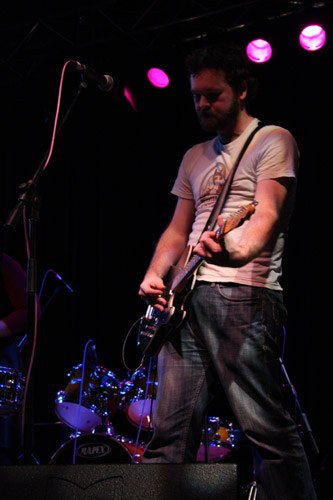 Brisbane indie label
Brisbane indie label 